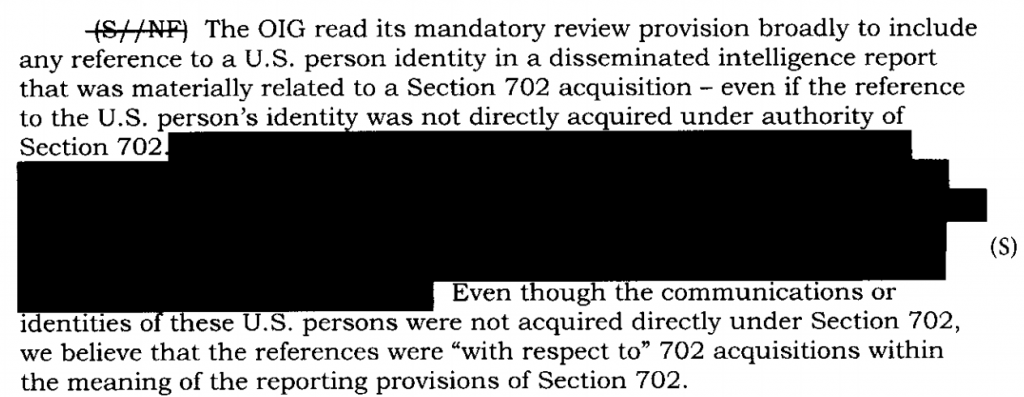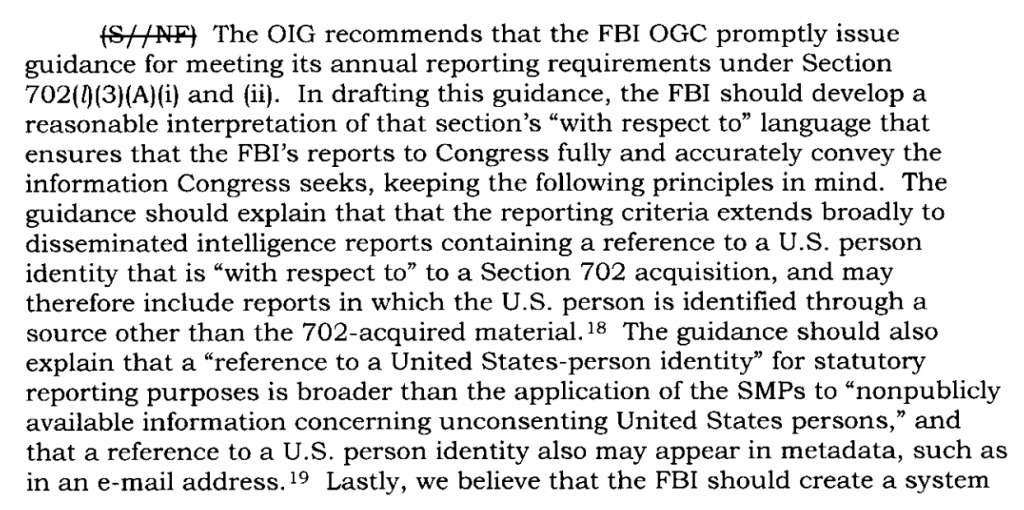As Recently as 2012, FBI Didn’t Think Your Phone Number Was Your Identity
Last week, Charlie Savage liberated additional disclosures on three IG reports he liberated last year: the 2007 NSL report, the 2009 Stellar Wind report, and a 2012 DOJ IG Section 702 report. With the NSL report, DOJ disclosed numbers that I believe were otherwise public or intuitable. With the Stellar Wind report, DOJ disclosed additional information on how the Department was dodging its obligation to notify defendants of the surveillance behind their cases; I hope to return to this issue.
By far the most important new disclosure, however, pertains to the FBI’s reporting on reports on US persons identified under Section 702 (see pages 17-18, highlighted by Savage here). Introducing the Executive Summary description of whether FBI was fulfilling reporting requirements, the report explained that the IG had adopted a fairly strict understanding of what constituted a US person dissemination.
Although the key passage is redacted (and the report body on this topic is almost entirely redacted), it’s clear that the IG considered reports that identified a US person via something other than his or her name without sharing the content of communications constituted a report “with respect to” 702 acquisitions.
The FBI had been arguing about these definitions internally and with DOJ’s IG since at least 2006, when it failed to comply with the legally mandated requirement for new minimization procedures to go with Section 215. One way to understand an early version of the debate is whether, by retaining call records that don’t include a name but do include phone numbers that clearly belong to a specific person, the FBI was retaining US person identifying information. For obvious reasons — because if their minimization procedures treated a phone number as US person identifying information, then it would mean it couldn’t retain 5 years of phone records — FBI didn’t want to treat a person’s unique identifiers as person identifying information. The minimization procedures adopted in 2013 must mirror this problem given that FBI and NSA kept those records for another two years.
It appears the IG found the FBI’s reporting lacking in several ways: it did not include Section 702 related reports that identify a US person if that person (which I assume to mean that person’s identity) was identified via other means, and argued FBI should also count reports if the US person information in it was publicly available. In addition, the IG considered a metadata reference to also constitute a US person reference.
This suggests the FBI was, until 2012, at least, not including the sharing of an email or even a report that identified the person tied to an email if it found that email, but not that person’s identity, via Section 702 in its reports to Congress. Imagine, for example, if FBI didn’t consider my emptywheel email personally identifying of me, emptywheel, until such time as it publicly tied that email address to me. It would be bullshit, but we know that seems to be the kind of game FBI was and probably still is playing.
I’m particularly interested in this because of a speech Dianne Feinstein made in December 2012 — presumably after FBI had made whatever response they might make to this IG report — that named a number of people as if they had been IDed using Section 702. But when several of them demanded notice of Section 702 surveillance, none of them got it, and Feinstein and the Senate’s lawyer insisted they could not make anything of her insinuation that Section 702 had discovered them.
In other words, the two standards at issue here — the minimization procedures standard and the notice one — may be implicated in DOJ’s opaque notice guidelines. We don’t know whether it is or not, of course, but if it is, it would suggest that DOJ is limiting 702 notices based on what kinds of identifiers 702 produces.
1/13: Tweaked this post for clarity. In addition, note these letters from the Brennan Center which relate to this issue.




For those who have worked phones, there is a certain type of list, where the numbers were very specific to specific individuals.
Mooch list… These people lie like rugs…